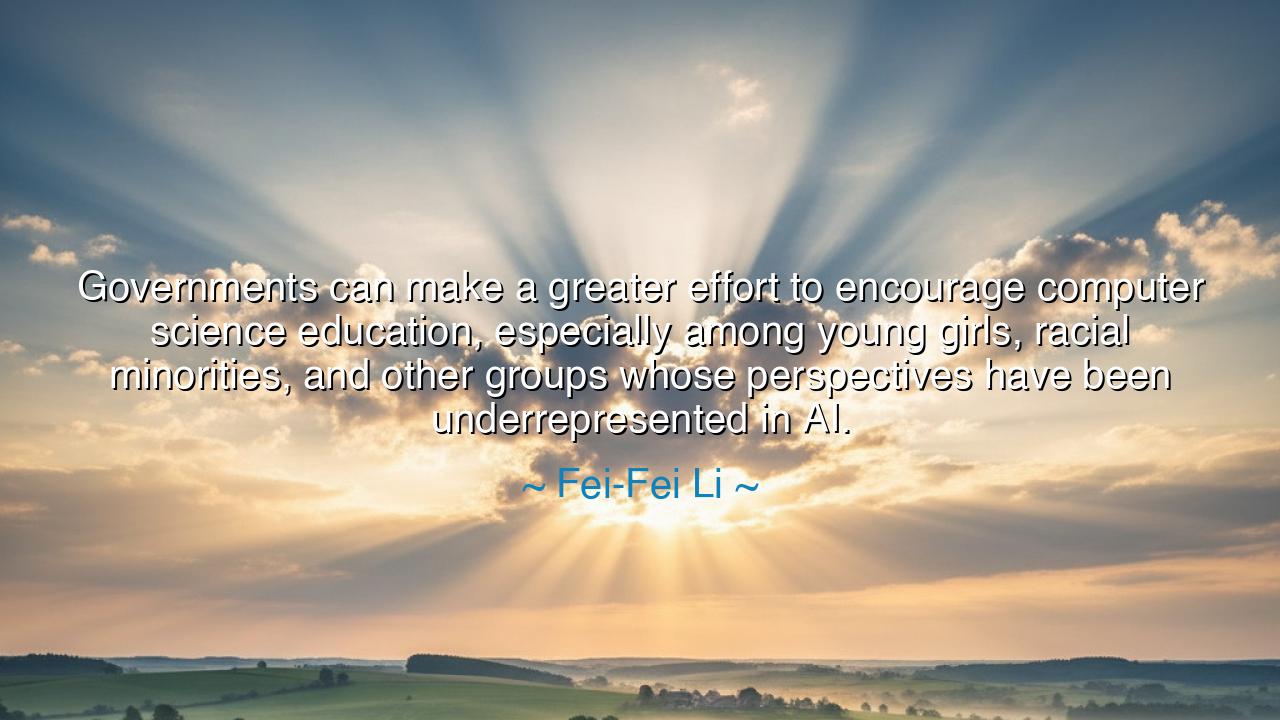
Governments can make a greater effort to encourage computer
Governments can make a greater effort to encourage computer science education, especially among young girls, racial minorities, and other groups whose perspectives have been underrepresented in AI.






The visionary scholar Fei-Fei Li, a pioneer of artificial intelligence and a voice of conscience in the age of machines, once declared: “Governments can make a greater effort to encourage computer science education, especially among young girls, racial minorities, and other groups whose perspectives have been underrepresented in AI.” These words, though born of the modern age, carry the ancient rhythm of justice and the eternal call to balance. For they remind us that knowledge, when hoarded by the few, becomes power without harmony—and power without harmony breeds division. To create intelligence, whether of man or machine, without the full chorus of humanity is to craft a song missing half its notes.
In every age, there comes a time when the tools of creation outpace the wisdom of their makers. The plow transformed the earth, the printing press transformed the mind, and now the computer transforms the very spirit of knowledge itself. AI, the newest and most mysterious of human inventions, is a mirror reflecting not only our intellect, but our values, our biases, and our dreams. Thus, Fei-Fei Li’s call is not merely for education—it is for justice in the making of the future. When only a few voices shape the minds of machines, those machines will learn a world half-seen and half-felt, blind to the vast beauty of diversity that sustains the human race.
In her own life, Fei-Fei Li embodies the bridge between wisdom and progress. Born in China and raised in the United States, she rose not through privilege but through perseverance. She became one of the architects of ImageNet, the great database that taught computers to see. Yet even amid this triumph, she saw the shadow—the danger of a technology crafted by a narrow circle of minds. She witnessed how facial recognition systems failed to recognize darker skin, how digital assistants mirrored gender stereotypes, how algorithms echoed human prejudice. Thus her call came forth: not for restraint, but for inclusion—for the gathering of all humanity into the temple of learning, that the intelligence we build may reflect the wholeness of humankind.
Let us remember that this struggle is not new. In the days of Hypatia of Alexandria, one of the first women scholars of the ancient world, learning was guarded by gatekeepers. Though she taught philosophy and mathematics to both men and women, she lived in a world that feared the voice of a woman who could reason. Her murder was not only the silencing of a philosopher, but a warning of what happens when knowledge is chained by prejudice. Today, centuries later, Fei-Fei Li’s words are a plea to break those same chains—so that no child, regardless of gender or race, shall be denied the right to build the future.
For when education becomes the inheritance of all, civilization rises like a dawn. The hands of many build what the minds of many envision. When young girls learn to code, they do not merely write instructions for machines—they write themselves into history. When minorities gain access to computer science, they bring perspectives shaped by struggle and resilience, enriching technology with empathy. Each diverse voice added to AI is a thread in a greater tapestry, ensuring that the intelligence we create is not cold and mechanical, but wise and compassionate.
Fei-Fei Li’s message is thus both a warning and a promise. If we neglect inclusivity, we will build a world of systems that fail to see the fullness of humanity. But if we rise to her call, we will create a future where technology becomes an instrument of harmony rather than division. The power of governments, she reminds us, is not in control but in cultivation—to plant seeds of opportunity where none have grown before, to water the gardens of the mind so that every child may bloom into genius.
The lesson, therefore, is this: Seek equity in education, for it is the root of justice and the guardian of progress. Let each of us, whether teacher or parent, leader or student, work to widen the gates of knowledge. Support programs that teach coding to girls, fund schools that bring computers to the poor, and challenge every system that excludes. For in the age of AI, the question is not whether machines will learn—it is what they will learn, and from whom. If humanity teaches them with openness and diversity, they will mirror our noblest selves.
So let Fei-Fei Li’s words be etched into the hearts of all who dream of a better world: that the truest education is not the privilege of a few, but the birthright of all. Let every mind be welcomed into the creation of the future, and every heart be heard in the chorus of intelligence. For when knowledge becomes shared, and learning becomes equal, then—and only then—shall our inventions serve not just progress, but humanity itself.






AAdministratorAdministrator
Welcome, honored guests. Please leave a comment, we will respond soon